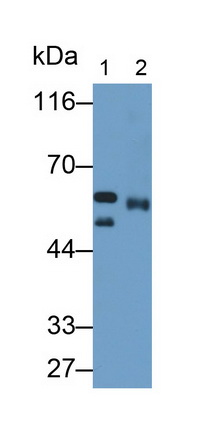Monoclonal Antibody to Matrix Metalloproteinase 8 (MMP8) 

CLG2; HNC; PMNL-CL; Collagenase 2; Neutrophil Collagenase; PMNL collagenase
Overview
Properties
- Product No.MAA103Ra22
- Organism SpeciesRattus norvegicus (Rat) Same name, Different species.
- ApplicationsWB
If the antibody is used in flow cytometry, please check FCM antibodies.
Research use only - DownloadInstruction Manual
- CategoryEnzyme & KinaseInfection immunityCardiovascular biology
- SourceMonoclonal antibody preparation, Host Mouse
- Ig Isotype IgG1 Kappa, Clone Number D2
- PurificationProtein A + Protein G affinity chromatography
- LabelNone
- Immunogen RPA103Ra02-Recombinant Matrix Metalloproteinase 8 (MMP8)
- Buffer Formulation0.01M PBS, pH7.4, containing 0.05% Proclin-300, 50% glycerol.
- TraitsLiquid, Concentration 1mg/ml
Sign into your account
Share a new citation as an author
Upload your experimental result
Review

Contact us
Please fill in the blank.
Specifity
The antibody is a mouse monoclonal antibody raised against MMP8. It has been selected for its ability to recognize MMP8 in immunohistochemical staining and western blotting.
Usage
Western blotting: 0.5-2µg/mL;
Immunohistochemistry: 5-20µg/mL;
Immunocytochemistry: 5-20µg/mL;
Optimal working dilutions must be determined by end user.
Storage
Store at 4°C for frequent use. Stored at -20°C in a manual defrost freezer for two year without detectable loss of activity. Avoid repeated freeze-thaw cycles.
Stability
The thermal stability is described by the loss rate. The loss rate was determined by accelerated thermal degradation test, that is, incubate the protein at 37°C for 48h, and no obvious degradation and precipitation were observed. The loss rate is less than 5% within the expiration date under appropriate storage condition.
Giveaways
Increment services
-
 Antibody Labeling Customized Service
Antibody Labeling Customized Service
-
 Protein A/G Purification Column
Protein A/G Purification Column
-
 Staining Solution for Cells and Tissue
Staining Solution for Cells and Tissue
-
 Positive Control for Antibody
Positive Control for Antibody
-
 Tissue/Sections Customized Service
Tissue/Sections Customized Service
-
 Phosphorylated Antibody Customized Service
Phosphorylated Antibody Customized Service
-
 Western Blot (WB) Experiment Service
Western Blot (WB) Experiment Service
-
 Immunohistochemistry (IHC) Experiment Service
Immunohistochemistry (IHC) Experiment Service
-
 Immunocytochemistry (ICC) Experiment Service
Immunocytochemistry (ICC) Experiment Service
-
 Flow Cytometry (FCM) Experiment Service
Flow Cytometry (FCM) Experiment Service
-
 Immunoprecipitation (IP) Experiment Service
Immunoprecipitation (IP) Experiment Service
-
 Immunofluorescence (IF) Experiment Service
Immunofluorescence (IF) Experiment Service
-
 Buffer
Buffer
-
 DAB Chromogen Kit
DAB Chromogen Kit
-
 SABC Kit
SABC Kit
-
 Long-arm Biotin Labeling Kit
Long-arm Biotin Labeling Kit
-
 Real Time PCR Experimental Service
Real Time PCR Experimental Service
Citations
- A Combinatorial Relative Mass Value Evaluation of Endogenous Bioactive Proteins in Three-Dimensional Cultured Nucleus Pulposus Cells of Herniated Intervertebral Discs: Identification of Potential Target Proteins for Gene Therapeutic ApproachesPlosone: Source
- Effects of Photodynamic Therapy on the Clinical and Gingival Crevicular Fluid Inflammatory Biomarkers in Chronic Periodontitis: A Split-Mouth Randomized Clinical TrialJoponline: 130464
- Analysis of the expression of nine secreted matrix metalloproteinases and their endogenous inhibitors in the brain of mice subjected to ischaemic strokePubmed:24671655
- An Experimental Model for Inducing Periodontal Pathology in Rat: Histopathological and Enzymatic AspectsUsamvcluj:Source
- Treatment with anti-RANKL antibody reduces infarct size and attenuates dysfunction impacting on neutrophil-mediated injuryPubmed:27056420
- Assessment of MMP-1, MMP-8 and TIMP-2 in experimental periodontitis treated with kaempferolpmc:PMC4848383
- From varices to venous ulceration: the story of chronic venous disease described by metalloproteinases.Pubmed:26991748
- Alamandine abrogates neutrophil degranulation in atherosclerotic mice.pubmed:27930810
- From varices to venous ulceration: the story of chronic venous disease described by metalloproteinasespubmed:26991748
- Rapid detection of urinary soluble intercellular adhesion molecule-1 for determination of lupus nephritis activityPubmed:29953010
- Atherosclerotic plaque vulnerability is increased in mouse model of lupusPubmed: 33110193






